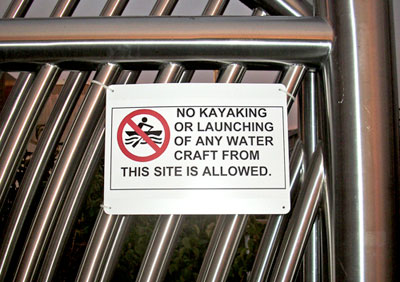The city has cut some access to the Newtown Creek for boaters days after the federal government listed the creek as a toxic Superfund site — but the feds and local kayakers argue that the city is overreacting.
Kayakers were alarmed to find new signs posted at the entrance of the Newtown Creek Nature Walk near Paidge Avenue that read, “No kayaking or launching of any water craft from this site is allowed.”
A Department of Environmental Protection spokesman asserted that the city is “reassessing boating access via city property in such waters” in light of the Environmental Protection Agency’s recent Superfund listing.
But an EPA official said that the federal government’s Superfund designation “does not impose restrictions on recreational access” for boaters on Newtown Creek, which will soon be the site of sampling and testing of contaminated sediment.
The policy clash between city and federal agencies confused environmental advocates, who chided city officials for restricting access to the creek.
“The Newtown Creek Monitoring Committee has worked to get people on the water, and we have concerns that kayaking may be prevented,” said Greenpoint resident Laura Hofmann. “We want kayakers to be able to continue kayaking.”
Community Board 1 member Dewey Thompson, an avid kayaker, added that the city’s timing couldn’t be worse.
“We’re just starting to open up the creek to boating [so] we’re really intent on not shutting that down,” said Thompson. “The creek is accessible and a fascinating, historic waterway.”
The $3.2-million nature walk, which opened in 2007 in the shadow of the $5-billion Newtown Creek Wastewater Treatment Plant, features a long concrete wall that leads to the creek, with a series of large concrete steps that descend directly into the murky water.
Around the corner at a 90-degree angle, there is a raised platform where kayakers have been launching their boats into the creek.
A city environmental official defended the new restriction, noting that it was necessary to prohibit swimming and other recreational activity from a city-owned public park, due to liability concerns.


























